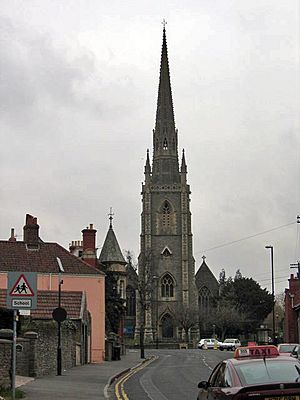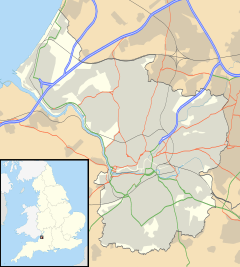Church of Holy Trinity, Stapleton facts for kids
Quick facts for kids Church of Holy Trinity, Stapleton |
|
|---|---|
 |
|
| Religion | |
| Affiliation | Anglican |
| District | Stapleton |
| Location | |
| Location | Bristol, England |
| Architecture | |
| Architect(s) | John Norton |
| Architectural style | Victorian Gothic |
| Completed | 1857 |
| Specifications | |
| Spire(s) | 1 |
| Spire height | 52 m (170 ft) |
The Church of Holy Trinity is an Anglican church found on Bell Hill in Stapleton, Bristol, England. It is a very special building because it has been named a grade II* listed building. This means it is an important historical building that needs to be protected.
Contents
History of the Church
Building the Church
The current church building was finished in 1857. It was designed by an architect named John Norton. He built it in a style called Gothic Revival. This style looks like the old churches from the Middle Ages. The church has a tall spire that reaches 52 meters (170 feet) into the sky.
People believe that a church has stood on this spot for at least 500 years! The money to build this new church came from James Henry Monk. He was the Bishop of Gloucester and Bristol at the time.
Materials Used
The builders used special stones to construct the church. They used Pennant stone from a local quarry called Broom Hill. For the decorative parts, they used Bath Stone. The church has a main hall called a nave with five sections. It also has a chancel with three sections, which is the part of the church near the altar.
Inside the Church
Ancient and Modern Features
When you go inside the Church of Holy Trinity, you can see many interesting things. There is a very old font in the West porch. This font is used for baptisms and is about 1000 years old! There is also another fancy Victorian-style font. It has a special cover and was brought from a different church.
Organ and Stained Glass
The church has an organ made by Vowles of Bristol. It was put into the church in the 1970s. You can also see beautiful stained glass windows. One window, made in 1887, was created by Charles Eamer Kempe. Another window is a special memorial for Captain Gore-Langton. He was the son of William Gore-Langton (1760–1847) and died in a famous battle called the Battle of Waterloo.
Keeping the Church Safe
Repairs Needed
In 2015, people started an appeal to raise money for the church. They needed £250,000 to fix parts of the building and the roof. The church tower also needs repairs. Because of its condition, the six bells inside the tower might not be safe to ring.
Church Community
The Church of Holy Trinity is part of a larger group of churches. It belongs to the benefice of Frenchay and Stapleton. This group is part of the Diocese of Bristol, which is how the church connects to the wider Anglican church.
See also
- Churches in Bristol
- Grade II* listed buildings in Bristol
 | Janet Taylor Pickett |
 | Synthia Saint James |
 | Howardena Pindell |
 | Faith Ringgold |



